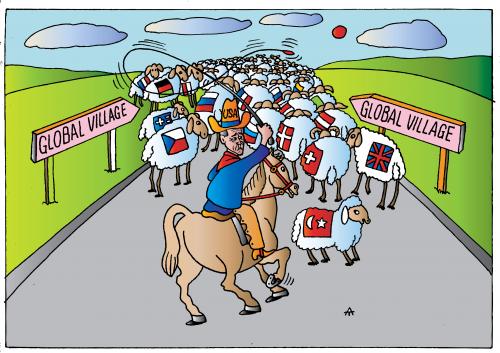Kenneth Rogoff writes: Europe’s migration crisis exposes a fundamental flaw, if not towering hypocrisy, in the ongoing debate about economic inequality. Wouldn’t a true progressive support equal opportunity for all people on the planet, rather than just for those of us lucky enough to have been born and raised in rich countries?
Many thought leaders in advanced economies advocate an entitlement mentality. But the entitlement stops at the border: though they regard greater redistribution within individual countries as an absolute imperative, people who live in emerging markets or developing countries are left out.
If current concerns about inequality were cast entirely in political terms, this inward-looking focus would be understandable; after all, citizens of poor countries cannot vote in rich ones. But the rhetoric of the inequality debate in rich countries betrays a moral certitude that conveniently ignores the billions of people elsewhere who are far worse off.
One must not forget that even after a period of stagnation, the middle class in rich countries remains an upper class from a global perspective.
Nor will it do to appeal to moral superiority to justify why someone born in the West enjoys so many advantages. Yes, sound political and social institutions are the bedrock of sustained economic growth; indeed, they are the sine qua non of all cases of successful development. But Europe’s long history of exploitative colonialism makes it hard to guess how Asian and African institutions would have evolved in a parallel universe where Europeans came only to trade, not to conquer.
Many broad policy issues are distorted when viewed through a lens that focuses only on domestic inequality and ignores global inequality. Thomas Piketty’s Marxian claim that capitalism is failing because domestic inequality is rising has it exactly backwards.
By many measures, global inequality has been reduced significantly over the past three decades, implying that capitalism has succeeded spectacularly.
Allowing freer flows of people across borders would equalize opportunities even faster than trade, but resistance is fierce.
As the world becomes richer, inequality inevitably will loom as a much larger issue relative to poverty, a point I first argued more than a decade ago. Regrettably, however, the inequality debate has focused so intensely on domestic inequality that the far larger issue of global inequality has been overshadowed. That is a pity, because there are many ways rich countries can make a difference. They can provide free online medical and education support, more development aid, debt write-downs, market access, and greater contributions to global security. The arrival of desperate boat people on Europe’s shores is a symptom of their failure to do so. Global Migration

